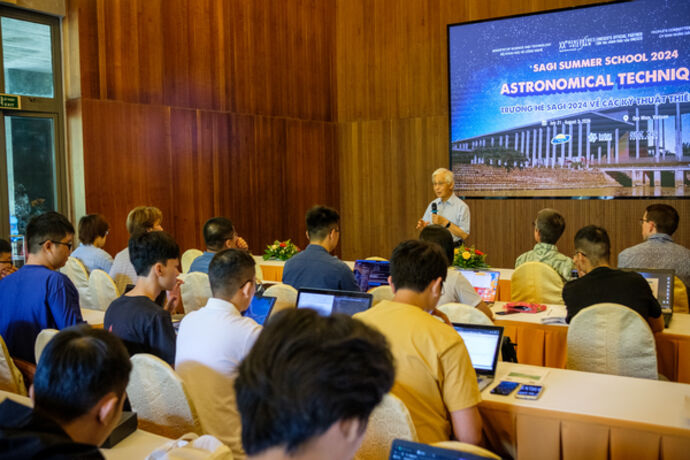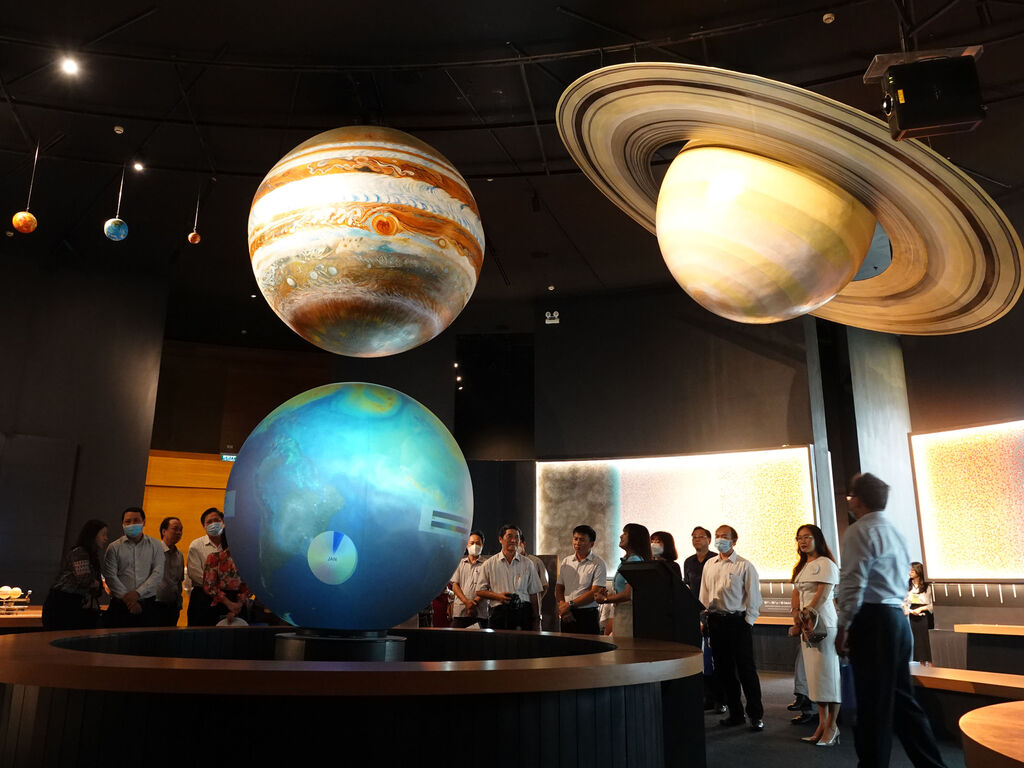
A starting point for astrophysics in Vietnam
About forty Vietnamese scientists and researchers as well as experts from France, Canada, the United States and Japan are gathering at the International Center for Interdisciplinary Science Education (ICISE) in Quy Nhon, Binh Dinh Province (Central), to participate in the SAGI 2024 Summer School of Astronomical Technologies.
>> Opening of two scientific conferences in astrophysics
>> Vietnamese wins Republic of Korea Astronomy Prize
>> Vietnam Neutrino School 2024 Opens in Quy Nhon
 |
| SAGI Summer School 2024 opening ceremony, Monday, July 22 in Quy Nhon. |
| Image: ICISE/CVN |
Astronomers and students are expected to work on robotic astronomy for two weeks, through August 3. The program, hosted by SAGI and the Quy Nhon Observatory, focuses on practical skills in instrument development, operation and data analysis.
The aim is to illustrate how important astronomy is to technological and scientific development, while answering frequently asked questions about the importance of astronomy, such as “Why should we study it?” or “Why should the government invest in it?”
 |
| Professor Tran Thanh Van, President of Vietnam Encounters and ICISE, during the opening ceremony of the SAGI 2024 Summer School, on July 22 in Quy Nhon. Photo: ICISE/CVN |
During the program, students will study astronomy and astrophysics with an emphasis on fundamental, scientific, and experimental questions. They will also learn how to use telescopes, design and test instruments, and experience the full scope of the instrument development process.
To enrich the learning experience, students will have the opportunity to visit the Explora Science Museum and Planetarium located on campus. An opportunity to deepen their understanding of astronomy and astrophysics beyond what is covered in the classroom and during observation sessions.
Speaking at the opening ceremony, held on Monday, July 22, Professor Tran Thanh Van, President of the Vietnam Encounters Association and ICISE, said: “Astronomy is a field that lacks human resources in Vietnam, so the SAGI Summer School is one of the important contents of the Astrophysics-SAGI project which aims to improve the research capacity of graduate students and astrophysicists. This school also contributes to raising the skills of the Quy Nhon Astronomical Observatory team, serving the community and participating in research work.“
He also added:We hope that the SAGI Summer School will provide a supportive environment that will help develop the capabilities and stimulate the passion of participating students for astrophysics.
To develop astrophysics in Vietnam
The Astrophysics Group (SAGI) operates within the framework of the Interdisciplinary Research Institute in Science and Education (IFIRSE), of ICISE, which was established by Professor Tran Thanh Van with the aim of contributing to the development of astrophysics in Vietnam.
 |
| Visitors at the Explora Science Museum at ICISE in Quy Nhon. |
| Photo: Hoang Truong/VNA/CVN |
SAGI is supported by overseas Vietnamese scientists such as Dr. Nguyen Truong Hien (Research Specialist at NASA Astrophysics Division – USA), Associate Professor – Dr. Hoang Chi Thiem (Southern Institute – Korea Astronomy and Space Science) and Nguyen Long Quang (American University of Paris, France).
Its main goal is to promote and support astronomical research by national astronomers through cooperation with international astronomers. Through this cooperation process, SAGI also hopes to build a team of high-quality young researchers for Vietnam, enabling them to follow the development trend of global astronomy. Ultimately, SAGI aspires to be a meeting place for young Vietnamese astronomers and scientists of Vietnamese origin working abroad to work together in Vietnam.
On July 21, Professor Jean-André Darriolat-Pierre (former Research Director at CERN and Scientific Advisor to the Vietnam Space Center) gave a public lecture on the topic of astronomy in Quy Nhon, on the occasion of the National Community Astronomy Week 2024.
Cam Sa/CVN

“Organizer. Social media geek. General communicator. Bacon scholar. Proud pop culture trailblazer.”
